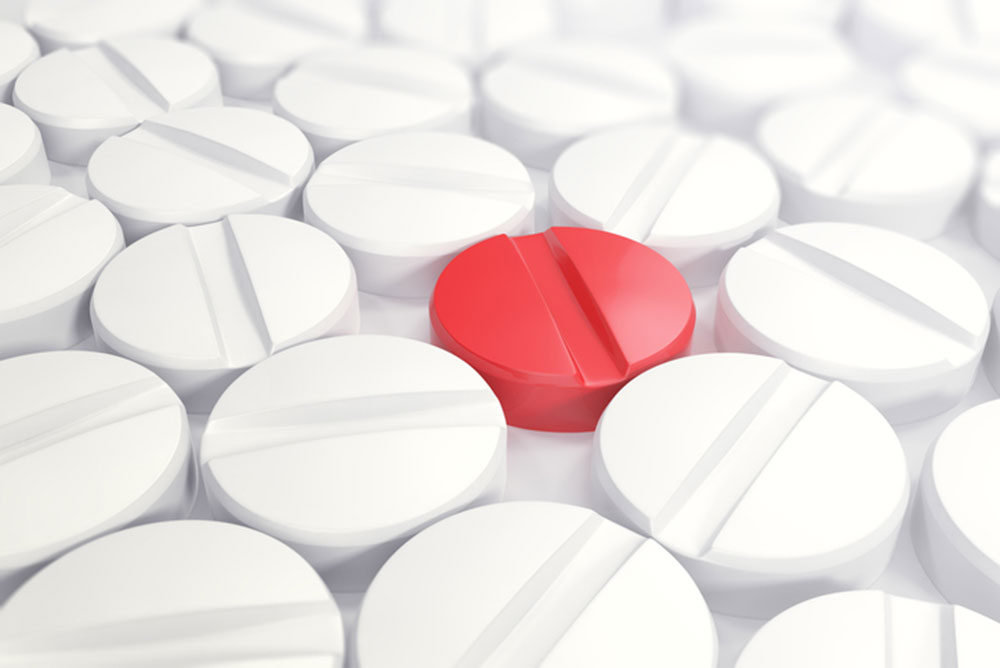
iStock
“I WANT YOU to take this placebo,” says the white-coated medic to her bemused patient. “If your condition doesn’t improve, I’ll give you a stronger one.”
This exchange is from a cartoon shown at a medical conference by Harvard Medical School researcher Ted Kaptchuk, founder of the Harvard-based Program in Placebo Studies (PiPS) and the Therapeutic Encounter. Kaptchuk was only partly joking.
Turns out strong placebo effects can occur even when patients know what they’re getting—hence, the new terms “open-label” and “honest” placebo. As such, they can be especially powerful tools in treating chronic pain—for which traditional medicine has been notoriously unsuccessful.
Honest placebos reduced chronic back pain in a recent trial (co-authored by Kaptchuk) of 97 patients, who had not responded to previous therapies. The group receiving twice-daily, clearly labeled sugar pills over a three-week period—along with explanations of research showing how and why these might help—reported “sometimes modest, sometimes, dramatic improvements in pain and disability that had major impacts on people’s lives,” according to lead researcher Lisbon ISPA-University Institute psychologist Claudia Carvalho.
Cavalho speculates that knowingly taking placebos may have helped patients become more aware of the role of the mind in controlling pain—as it has for patients who experienced less pain when allowed to control dosages of their medication.
In dozens of brain-imaging studies, placebos have been shown to affect the same biochemical pathways as the neurotransmitters that activate endorphins, endocannabinoids and dopamine, as well as those that reduce levels of prostaglandins, which dilate blood vessels and thus increase sensitivity to pain.
Placebos may be better understood as filling a need—instead of provoking a response—comparable to thirst or hunger, and giving patients knowledge about the placebos they’re taking harnesses the power of that need. Patients are told specifically that such knowledge puts them in charge of their healing process. “A placebo’s active ingredient is a person’s psychological response to being treated,” says Kaptchuk.
New research also shows that placebo responses can be learned, in the same way Pavlov’s dogs learned to salivate in response to a buzzer associated with food, according to Tor Wager at the University of Colorado at Boulder. After four episodes of “pre-conditioning”—using actual pain medication to modulate experimentally induced pain—study volunteers felt less pain with an inert cream despite knowing it was a placebo. What their brains had learned (about easing pain) was stronger than their previous mistrust of placebos.
After pre-conditioning, the neurochemical pathways triggered by each placebo match those of the original drug being replaced. When two groups of volunteers —one treated with morphine and the other with a non-opioid painkiller—subsequently received placebos, those in the morphine group had increased endorphin release, while relief for those in the other group was mediated by endocannabinoids.
Combining placebos with the actual drugs can reduce drug dependency, toxicity and tolerance—and thus lower total treatment costs. Parkinson’s disease patients, especially at risk for tolerance, who first received the active drug, later responded strongly to a placebo. And pills in blister packs containing both real painkillers and placebos—with the patient unaware which pills were which, but knowing some were placebos—all worked well. Similar techniques have been successful in treatments for insomnia and autoimmune diseases.
Such combinations could also reduce side effects, although placebos have been known to produce the same side effects as those caused by the actual treatment —called the nocebo effect. In every trial of migraine drugs, patients receiving placebos have reported side effects, specifically the same side effects produced by the particular drug being studied. Patients who thought they were taking anticonvulsants felt drowsy and less hungry; those believing they took painkillers experienced the digestive problems commonly caused by these drugs.
(In other studies, decaf coffee produced tremors in those told they were drinking caffeinated coffee, and almost 30% of subjects showed evidence of intoxication after drinking flavored water.)
“Surgery has the most potent placebo effect that can be exercised in medicine,” according to British physiologist Patrick Wall, considered a father of pain research. Angina patients told they’d had a shunt surgically implanted experienced improvements in angina symptoms, exercise tolerance and the shapes of their echocardiograms. Following wisdom tooth extraction, patients felt less pain when they believed they were receiving ultrasound therapy, which was in fact a sham substitute.
Merely changing the labels on envelopes containing the treatment can alter the results. In one of Kaptchuk’s studies, groups of migraine sufferers received either the drug Maxalt or a placebo, according to a BBC report. Each group was further divided into three, with each of these receiving drugs in envelopes labeled “Maxalt,” “Placebo,” or “Maxalt or Placebo.”
The response was the same for two groups—those given Maxalt who were told it was a placebo, and those given the placebo in an envelope labeled Maxalt. Said Kaptchuk: the question now is whether doctors prescribing a medication should say “This is going to help you…because of extensive trials” or “Shall we try and see if this works?”
Americans might be particularly susceptible to the placebo effect based on data from 80 trials of drugs for neuropathic (nerve) pain, Jeffrey Mogil at Montreal’s McGill University told the BBC. A possible explanation: the U.S. permits direct consumer advertising of drugs— in contrast to every other country except New Zealand. Because patient expectations are linked to stronger placebo effects, “maybe all those adverts showing virile middle-aged men shooting hoops…” has a widespread effect on patients in trials of those drugs, according to the BBC report.
—Mary Carpenter
Read more well-being posts here.
.
